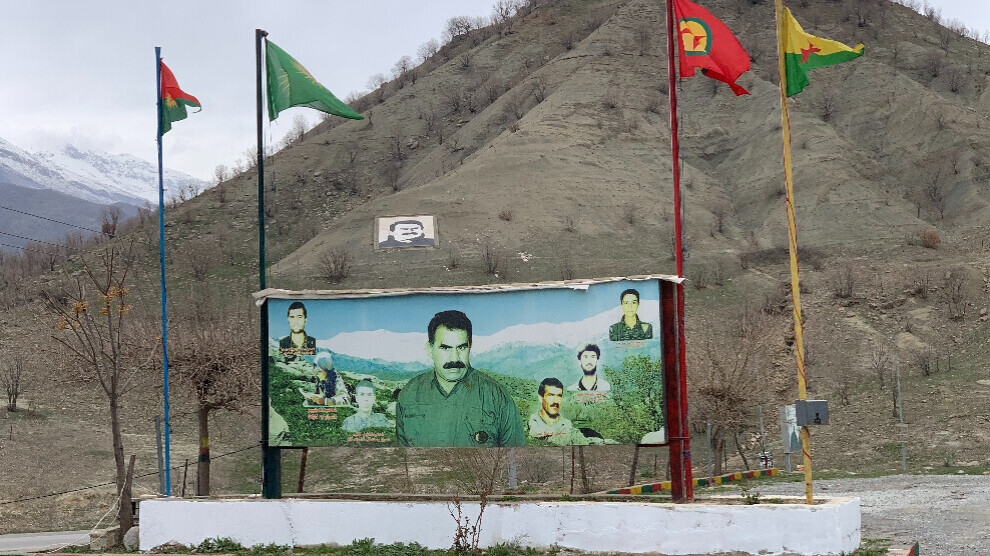Qandil ready for Newroz
The mountain community of Qandil in South Kurdistan is preparing for a big Newroz celebration again this year. The first guests have already arrived, and ANF South Kurdistan correspondent Rêbaz Hesen is also on site.
The mountain community of Qandil in South Kurdistan is preparing for a big Newroz celebration again this year. The first guests have already arrived, and ANF South Kurdistan correspondent Rêbaz Hesen is also on site.

In the Qandil Mountains in South Kurdistan, a large Newroz celebration will take place on March 21, with many people expected to attend. ANF South Kurdistan correspondent Rêbaz Hesen is already on site and has been following the preparations.
According to Mihemed Hesen, co-mayor of the community of Qandil, preparations for the celebrations have been completed. Some of the out-of-town guests have already arrived, he said: "We have made all the necessary preparations to celebrate Newroz properly this year. The festival site is ready and the catering for our guests is guaranteed. We have also taken environmental protection into account in our planning."
Buses have been organized in Sulaymaniyah for a joint journey to Qandil. In addition, numerous musicians have been invited. According to the preparatory committee, Peyam Rojhilatî, Semîre Karzan, Ferşad Emînî, Niyan Abdullah, Hozan Kawa, Luqman Selîm, Kerîmxan Surçî, Jîna Seqizî and Koma Çiyayê Şengalê will perform at the Newroz celebration.
Binarê Qandil: Self-government beyond domination
The southern Kurdish mountain community of Binarê Qandil is a model of radical democratic self-government. Communal life is organized at all levels through councils, and problems are solved by the community. Qandil is known for the beauty and majesty of its nature. The landscape is characterized by huge mountain massifs, winding paths, green forests and fertile alpine pastures. The region with its 63 villages has been organizing itself for years according to the model of democratic autonomy and the basic principles of the gender-free paradigm of the Kurdish freedom movement. Binarê Qandil consists of five regions: Navdeşt, Dola Şaroş, Qelatûkan, Maradu and Dola Baleyan.
An island of democratic autonomy
The community is disconnected from the ruling structures of Iraq and Southern Kurdistan and organizes everything on a communal level. The self-sufficient economy is sustained by collective production. In doing so, the people do not follow a wage- or profit-based approach, but organize a needs-based economy in a communal way. This means that what people need is produced. Any problems are solved by councils. The self-government of Binarê Qandil is composed of the town hall, the council, women's organizations and youth organizations.
Building a democratic society
The institutions of self-government focus on solving problems and are oriented toward the needs of the population. Schools, places of worship that respect all religions, and roads have been built in the villages. Problems with heating, electricity and water supply are solved by the corresponding institutions of self-organization, and basic services are provided for the population. In Binarê Qandil, agricultural products are harvested through collective labor and distributed in a communal manner. Representatives of the councils are constantly on the road and visit the people in order to grasp the problems of the population and to be able to develop solutions.
Binarê Qandil has playgrounds for children, sports complexes for young people and workshops for women. In contrast to Iraq and Southern Kurdistan, where the electricity and infrastructure problem has not been solved for years, it has been solved in Binarê Qandil.
The co-presidency system
All council structures, including the People's Council of Binarê Qandil, operate according to the principle of gender-parity dual leadership. Accordingly, each mixed structure must be headed by a man and a woman. The People's Council of Binarê Qandil consists of 100 representatives of the village councils. Both the leadership commission and co-chairs are elected every two years.
The People's Council of Binarê Qandil
The first conference of the People's Council of Binarê Qandil was held in the village of Enzê on December 23, 2017. The statute adopted there states that "The People's Council is an institution of society that works to improve the living conditions of the inhabitants in the region, to serve them and to create social peace. The Council is committed to the equitable resolution of problems, the protection of habitats and the development of regional products. It is based on harmonious cooperation with other institutions of society for the benefit of the people."